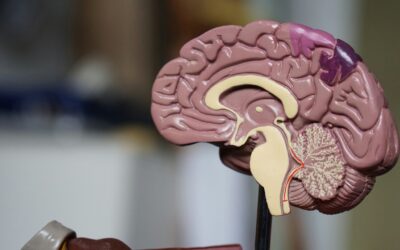Last updated: November, 2025
Trauma and addiction are deeply connected experiences. Many people who have lived through trauma turn to substances or compulsive behaviours to escape emotional pain or regain a sense of control. What begins as relief often becomes dependence, creating a cycle that keeps both wounds alive. Addiction can intensify trauma symptoms, such as anxiety, flashbacks, insomnia, or emotional instability, while trauma can make recovery feel overwhelming.
At Hacienda Paradiso in Málaga, recovery begins with compassion. Understanding that addiction often arises as a way to cope, not as a failure, helps individuals rebuild trust within themselves. Healing truly begins when both trauma and addiction are treated together, allowing mind, body, and spirit to recover in harmony.
Understanding the Connection Between Trauma and Addiction
Trauma changes how the brain manages stress and emotion. When the nervous system stays in constant alert, even small triggers can bring back fear or helplessness from the past. Substances might seem to calm the body, but over time they deepen emotional disconnection and instability.
Signs that trauma and addiction are linked often include using alcohol or drugs to manage distress, avoiding reminders of past events, feeling emotionally numb or constantly tense, and experiencing irritability or sudden anger. These reactions are not weakness. They are survival responses, ways the body and mind have learned to protect themselves. Healing means learning to feel safe again, both inside and out.
Why a Holistic Approach Matters
True recovery is about more than stopping substance use. It is about restoring connection, calm, and self-trust. A holistic approach addresses every aspect of healing, bringing together psychotherapy, mindfulness, physical wellbeing, and emotional support.
At Hacienda Paradiso, recovery integrates therapy, somatic awareness, nutrition, and nature-based practices. The goal is not perfection but presence: to feel whole, balanced, and alive again.
Psychotherapy and Trauma-Focused Cognitive Behavioral Therapy
Cognitive Behavioral Therapy (CBT) is one of the most effective tools for trauma-related addiction. It helps individuals understand how past experiences shape current emotions and habits. By identifying and reframing negative thoughts, people learn to respond to challenges in healthier, more grounded ways.
Trauma-focused CBT introduces gentle techniques for processing memories without retraumatising the individual. Through this process, emotions become easier to manage, and daily life feels more stable and clear.
Mindfulness and Emotional Regulation
Mindfulness helps the body and mind return to the present. It teaches awareness without judgment, allowing emotions to move naturally rather than take control. Simple practices such as breathing, sensory grounding, or meditation reduce anxiety and restore calm.
Mindfulness also nurtures self-compassion. Many trauma survivors carry deep guilt or shame. Learning to observe thoughts gently, instead of fighting them, allows peace to grow where fear once lived.
Nature Immersion and Wellness Activities
Healing thrives in nature. Spending time outdoors lowers stress hormones, improves mood, and brings perspective. Activities such as yoga in the open air, meditation by the water, or guided walks encourage relaxation and grounding.
At Hacienda Paradiso, nature is part of the therapy. The quiet sounds, the fresh air, and the soft light all help the mind slow down and the body feel safe again.
Physical Activity and Somatic Healing
Trauma often leaves traces in the body. Muscle tension, fatigue, or restlessness are common signs. Somatic therapies, including gentle exercise, stretching, and breathwork, help regulate the nervous system and reconnect body and mind. Through movement, individuals release what words cannot express, creating space for calm and confidence.
Nutrition and Restorative Health
Balanced nutrition supports recovery by stabilising energy and mood. Food becomes part of healing, providing the nutrients the brain and body need to function clearly again. Combined with proper rest and hydration, these small acts of care strengthen both resilience and emotional stability.
Creating Safety Through Privacy and Confidentiality
Safety is the foundation of trauma recovery. In a private and confidential setting, individuals can share their experiences openly and without fear of judgment. A calm, respectful environment allows true healing to begin.
At Hacienda Paradiso, every story is met with compassion. Each person receives care that honours their pace and individuality, creating a sense of safety and belonging.
Integrated Support for Long-Term Recovery
Healing from trauma and addiction is a continuous process that extends beyond therapy sessions. Long-term recovery includes emotional guidance, structure, and a supportive network.
Family Therapy and Connection
Relationships are essential in recovery. Family therapy rebuilds trust, strengthens communication, and helps loved ones understand how to support healing without falling into patterns of overprotection.
Aftercare and Relapse Prevention
Structured aftercare plans provide continuity and stability. These include follow-up therapy, wellness routines, and relapse prevention strategies. Healing continues each day, through awareness and healthy habits.
Community and Shared Healing
Group therapy and community programmes remind individuals that they are not alone. Sharing experiences brings empathy and connection, reinforcing courage and hope.

Why Holistic Recovery Works
Holistic recovery unites clinical science with emotional and physical wellbeing. When trauma and addiction are treated together, individuals regain more than sobriety: they recover balance, clarity, and inner peace.
At Hacienda Paradiso, healing takes place in a nurturing environment surrounded by nature. Therapy, mindfulness, physical activity, and nutrition come together to support each person’s unique process. The goal is not to erase the past, but to learn to live with it gently, with courage and compassion.
Recovery is not a straight line. It is a return to oneself, step by step, guided by presence, patience, and understanding.
Frequently Asked Questions: Trauma and Addiction Recovery
Trauma and addiction often develop together. Many people use substances to manage painful memories or emotions, while addiction increases anxiety and emotional instability. Healing requires treating both at once through therapy, mindfulness, and holistic care. This approach addresses not just behaviour, but also the emotional wounds beneath it, helping individuals regain safety and stability.
A holistic approach treats the whole person: mind, body, and spirit. Trauma affects physical health, emotions, and relationships. Combining therapy, mindfulness, physical activity, and nutrition allows deeper, more lasting healing. It helps people reconnect with themselves and find calm that extends beyond recovery.
Evidence-based methods such as trauma-focused Cognitive Behavioral Therapy and mindfulness-based approaches are highly effective. They reduce triggers, help process difficult emotions, and teach healthier coping skills. When paired with activities like yoga or nature therapy, recovery becomes more complete and sustainable.
Nature helps the body relax and the mind reset. Spending time outdoors reduces stress, promotes presence, and builds trust in the recovery process. At Hacienda Paradiso, nature is woven into treatment, offering peace, beauty, and quiet strength as part of every healing journey.
Yes. Long-term recovery is possible when both trauma and addiction are addressed together. With therapy, structure, and ongoing support, individuals learn to maintain emotional balance and resilience. Healing becomes not just about surviving, but about living fully, with calm, clarity, and connection.









